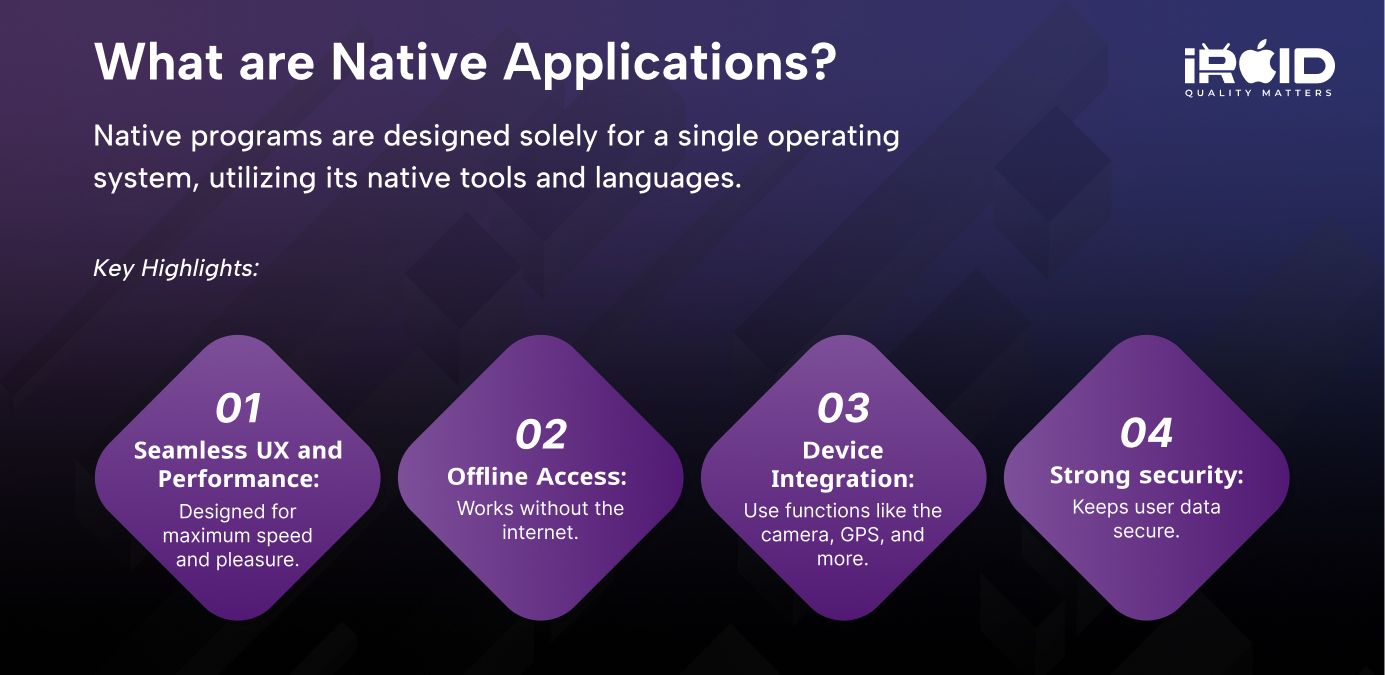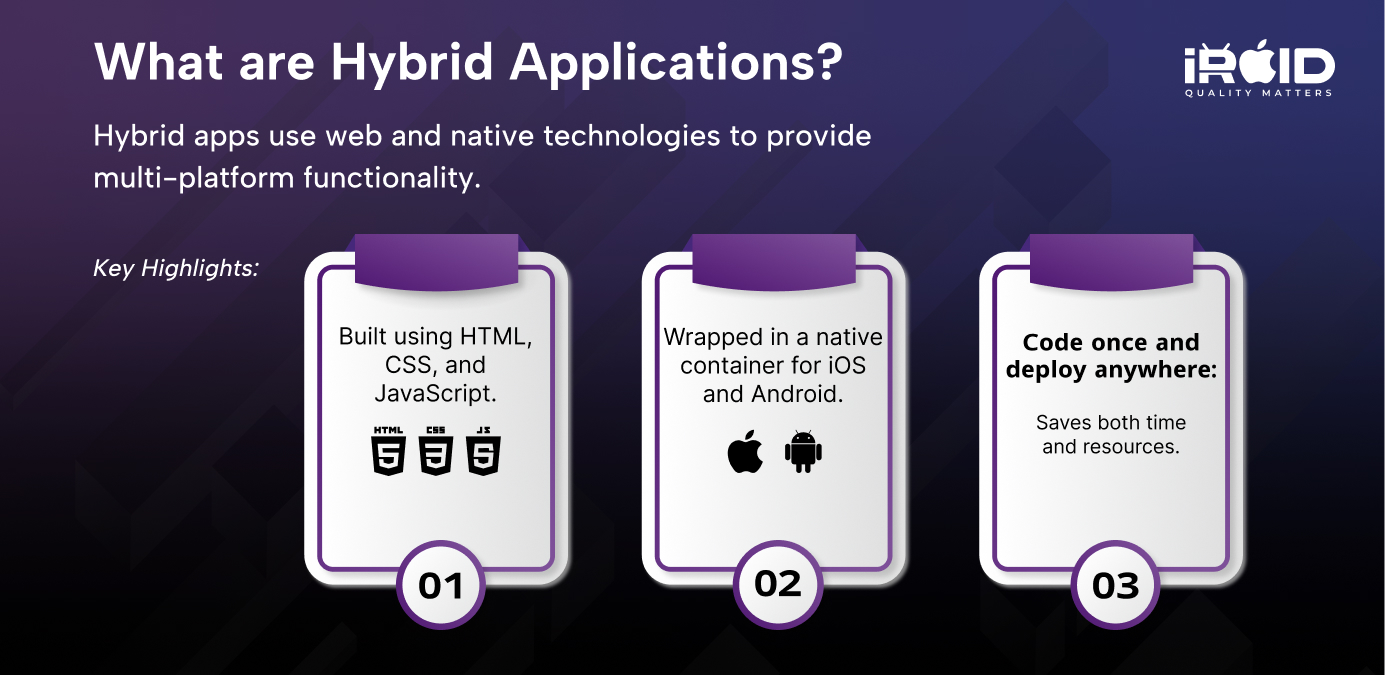Introduction
In today's rapidly evolving mobile app landscape, the choice between native and hybrid app development can significantly impact the success of your project. Let's dive into the nuances of these two approaches to help you make an informed decision.
What are Native Apps?

Native apps are developed specifically for a single operating system using the platform's native programming languages and APIs. Here are the key characteristics that set native apps apart:
-
User Experience (UX) and Performance: Native apps offer unparalleled user experience and performance due to their ability to leverage the full capabilities of the device's hardware.
-
Offline Functionality: Native apps can function offline, providing users with seamless access to content and features even without an internet connection.
-
Access to Device Features: Native apps can access and utilize the device's hardware features such as camera, GPS, and microphone, enhancing functionality and user engagement.
-
Security: Native apps typically have robust security measures in place, protecting both the user's data and the app itself from potential threats.
Advantages of Native Apps
-
Native apps are known for delivering superior performance and user experience compared to hybrid apps.
-
By utilizing platform-specific features, native apps can provide a more tailored and immersive user experience.
-
The direct access to device hardware allows native apps to deliver optimized performance and functionality.
Disadvantages of Native Apps
-
Developing native apps can be more costly and time-consuming compared to hybrid apps due to the need for separate codebases for each platform.
-
Platform-specific development requires expertise in each operating system, which can increase the complexity of the development process.
-
Maintenance of multiple codebases for different platforms can result in additional overhead and updates.
III. What are Hybrid Apps?

In the world of app development, two main approaches stand out: native and hybrid. While native apps are developed for specific platforms using programming languages like Swift or Java, hybrid apps combine elements of both web and native applications. Let's delve deeper into the realm of hybrid apps to understand their intricacies and benefits.
Define hybrid apps and their development process
Hybrid apps are essentially web apps wrapped in a native container, allowing them to function across multiple platforms. These apps are created using web technologies such as HTML, CSS, and JavaScript, and then packaged as native apps using frameworks like PhoneGap or Ionic. This approach enables developers to write code once and deploy it on various operating systems like iOS and Android.
Advantages of hybrid apps
-
Cost-Effectiveness: By using a single codebase for multiple platforms, hybrid app development significantly reduces costs compared to building separate native apps.
-
Cross-Platform Compatibility: Hybrid apps can run seamlessly on different devices, ensuring a wider reach among users.
-
Faster Development Time: With hybrid development, updates and changes can be implemented swiftly across all platforms, speeding up the overall development process.
-
Single Codebase for Maintenance: Maintaining a hybrid app involves updating a single codebase, simplifying the maintenance and support tasks for developers.
Disadvantages of hybrid apps
-
Limited Access to Native Features: Hybrid apps may face limitations in accessing certain native functionalities, potentially hindering the app's performance.
-
Potential Performance Issues: Due to their web-based nature, hybrid apps may experience performance bottlenecks compared to fully native applications.
-
Dependence on Web Connectivity: Since hybrid apps rely on web technologies, they might struggle to function offline or in areas with poor internet connectivity.
-
Less Intuitive UX: Developing a user-friendly interface on hybrid apps can be challenging, impacting the overall user experience and satisfaction.
IV. Choosing the Right Approach: Native vs. Hybrid
In the world of app development, the decision between native and hybrid approaches can be a crucial one. Each approach comes with its own set of considerations and implications. Let's dive into the factors you should consider when choosing the right approach for your app development project.
App Functionality and Complexity
-
Native apps are built for specific platforms using languages like Swift for iOS and Java for Android. They offer high performance and seamless integration with device features.
-
Hybrid apps use web technologies like HTML, CSS, and JavaScript to create a single code base that can run on multiple platforms. They are cost-effective and easier to maintain for simpler apps.
Target Audience and Platforms
-
Consider your target audience's preferences and behaviour. Native apps may offer a better user experience for platform-specific features, while hybrid apps can reach a broader audience across different platforms.
-
If your app needs to leverage the unique capabilities of a particular platform, such as ARKit for iOS or Google Maps for Android, a native approach may be more suitable.
Development Budget and Timeline
-
Native app development typically requires more time and resources due to platform-specific coding and testing. Hybrid apps can be developed faster and with lower costs, making them a popular choice for startups and smaller businesses.
-
Consider the trade-offs between development speed, cost, and long-term maintenance when making your decision.
User Experience Priorities
-
Native apps are known for providing a smooth and responsive user experience, thanks to their optimized performance and access to platform-specific features.
-
Hybrid apps may sacrifice some performance for cross-platform compatibility, so prioritize user experience based on your app's specific requirements.
Importance of Offline Functionality
-
Native apps can offer better offline functionality by storing data directly on the device, making them ideal for apps that need to work offline or in areas with poor connectivity.
-
Hybrid apps can also support offline usage through caching strategies, but they may not match the robustness of native solutions for offline scenarios.
"Choosing the right approach between native and hybrid app development requires a careful consideration of various factors to align with your project goals and user needs."
Decision-Making Matrix
To assist you in making the right choice for your app development project, here's a simple decision-making matrix:
|
Factor |
Native App Development |
Hybrid App Development |
|
App Functionality and Complexity |
High level of functionality and performance |
Suitable for simpler apps with faster development |
|
Target Audience and Platforms |
Platform-specific features for better user experience |
Broader audience reach across multiple platforms |
|
Development Budget and Timeline |
Higher costs and longer development time |
Lower costs and faster development cycles |
|
User Experience Priorities |
Optimized performance and seamless integration |
Balanced performance and cross-platform compatibility |
|
Importance of Offline Functionality |
Strong offline capabilities |
Caching strategies for offline usage |
By considering these factors and using the decision-making matrix, you can make an informed choice between native and hybrid app development approaches that best align with your project requirements and objectives.
Remember, the right approach will depend on a combination of technical considerations, user experience priorities, budget constraints, and long-term maintenance needs. Choose wisely, and your app will be set up for success in the competitive app market.
V. Examples of Successful Native and Hybrid Apps
Social Media
-
Native App: Facebook - Known for its high performance and seamless user experience, the Facebook app is a prime example of native app development. Its ability to leverage device-specific features like push notifications and camera access sets it apart.
-
Hybrid App: Instagram - Instagram combines the speed of a native app with the versatility of web technologies through its hybrid approach. This has allowed for quicker updates and cross-platform compatibility without compromising on user experience.
Gaming
-
Native App: Pokemon GO - This wildly popular AR game was built natively to maximize performance and utilize the full potential of mobile hardware. The immersive gameplay experience is a testament to the power of native app development.
-
Hybrid App: Angry Birds 2 - Despite being a hybrid app, Angry Birds 2 delivers smooth gameplay and impressive graphics. Its hybrid architecture enables constant updates and multi-platform support, making it a hit among gamers.
Productivity
-
Native App: Slack - Slack's native app offers lightning-fast communication and real-time collaboration features. The app's responsiveness and reliability are crucial for maintaining productivity in professional settings.
-
Hybrid App: Evernote - Evernote's hybrid app seamlessly syncs user data across devices while providing a consistent user interface. The hybrid approach has allowed Evernote to cater to multiple platforms efficiently.
VI. Conclusion
In conclusion, the choice between native and hybrid app development ultimately depends on your project’s unique requirements, budget, and timeline. While native apps excel in performance, user experience, and offline functionality, hybrid apps offer cost-effectiveness, faster development, and cross-platform compatibility. At iRoid Solutions, we specialize in both native and hybrid app development, tailoring solutions to align with your business goals. Whether you need high-performance apps or versatile cross-platform solutions, our expert team is here to help. Contact us today at iRoid Solutions or email us at business@iroidsolutions.in to bring your app vision to life!
Blog Related FAQs:
Native apps are built for a specific platform using platform-specific languages (e.g., Swift for iOS, Kotlin for Android), offering high performance and seamless UX. Hybrid apps use web technologies (HTML, CSS, JavaScript) wrapped in a native container, allowing them to work across multiple platforms with a single codebase.
Hybrid app development is generally more cost-effective as it uses a single codebase for multiple platforms, reducing development time and cost.
While hybrid apps are versatile, they may have slight performance limitations compared to native apps, especially for resource-intensive tasks like gaming or AR.
Hybrid apps can support offline functionality using caching, but native apps typically provide more robust offline capabilities.
Absolutely! At iRoid Solutions, we specialize in both native and hybrid app development, tailoring solutions to meet your business goals.
Contact us at iRoid Solutions via email at business@iroidsolutions.in or visit iroidsolutions.com to discuss your project requirements!
Recent Blog Posts
Get in Touch With Us
If you are looking for a solid partner for your projects, send us an email. We'd love to talk to you!














